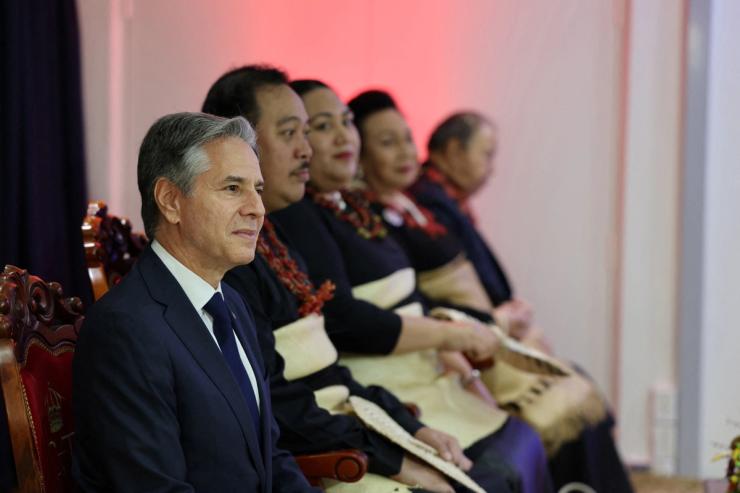The News
Senior U.S. officials courted leaders in Tonga, Papua New Guinea, Palau, and Micronesia this week in an effort to boost ties with island nations and counter China’s growing influence.
But Beijing’s presence is already strong in the South Pacific.
We’ve gathered news and insights on the Biden administration’s attempts to shore up diplomatic ties in the region.
Insights
- In January, the U.S. re-opened its embassy in the Solomon Islands after a 30-year absence. The country also recently opened an embassy in Tonga and plans to erect two more outposts in Vanuatu and Kiribati. But effective American diplomacy is “not just about opening up embassies,” said Anna Powles, a senior lecturer on geopolitics in the Pacific region at New Zealand’s Massey University. She suggested that U.S. diplomats stationed in island nations need language and cultural training to “engage with their host governments in culturally contextual, specific ways.” — The Washington Post
- The new U.S. embassies in the South Pacific are mere political symbols, according to one expert cited by Chinese state media Global Times. The U.S.‘s “aggressive moves” in the region illustrate its “strategic anxiety,” argued Chen Hong, head of the Asia Pacific Studies Center at East China Normal University. Chen said that Washington was treating the island nations like “strategic chess pieces in its rivalry with China.”
- Experts in Washington also cautiously acknowledged the U.S.’s geopolitical competition with China. They suggested that the U.S. can demonstrate how it values the Pacific nations by engaging with issues relating to climate change, such as “fisheries” and “critical minerals,” that are integral to the Pacific Islanders way of life. Many of them see global warming “as an existential threat” said Parker Novak with Atlantic Council’s Indo-Pacific Security Initiative. — NPR
- French leader Emmanuel Macron is also in the South Pacific to reestablish France’s “shaken legitimacy” amid the rise of pro-independence groups in French Pacific Territories, Céline Pajon of the French Institute of International Relations, wrote for The Diplomat. The announcement of AUKUS, a defense pact between Australia, the U.K., and the U.S. earlier this year, also dealt a blow to France which is seeking to position itself as a “balancing power” within the U.S.-China rivalry. Even if Paris lacks military capabilities, Macron should engage with the Indo-Pacific on global warming, environmental security, and maritime safety — “all of which are central to the concerns of the Pacific Island countries,” Pajon wrote.
AD


